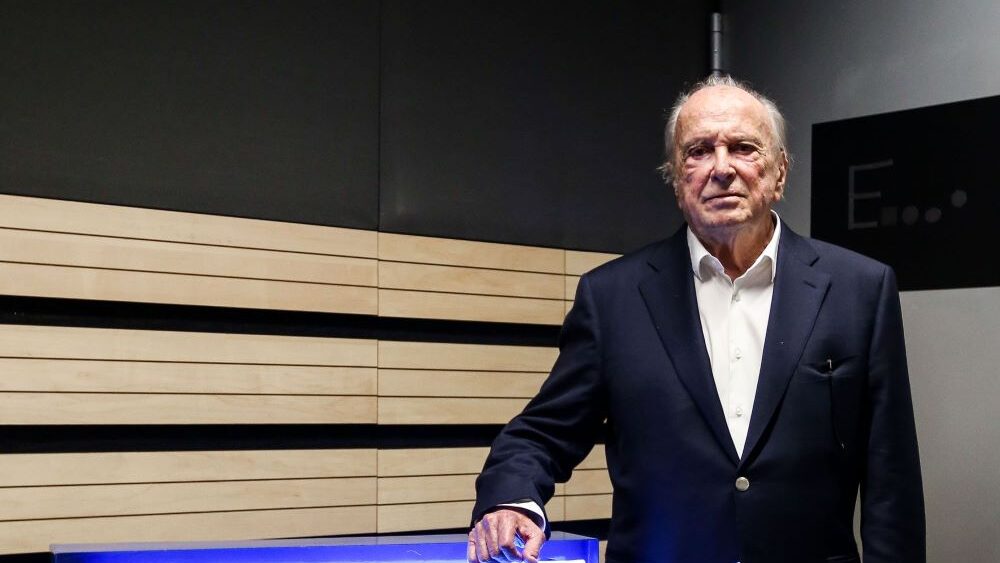Álvaro Santos Pereira takes office as Governor of the Bank of Portugal on 6 October
Government will appoint the OECD's chief economist and former Minister of Economy under Passos Coelho this Friday. The inauguration ceremony for Mário Centeno's successor will take place on Monday.
Álvaro Santos Pereira takes office as governor of the Bank of Portugal (BdP) next Monday, 6 October, at 10 a.m., ECO has learned. This Friday, the Government will officially appoint, in the Council of Ministers, the chief economist of the Organisation for Economic Co-operation and Development (OECD) and former Minister of Economy in Pedro Passos Coelho’s Executive as head of the banking regulator, after Parliament issued a favourable opinion on the Executive’s choice.
At the end of September, members of the Budget, Finance and Public Administration Committee approved, by a majority, the report on Álvaro Santos Pereira’s hearing in connection with his nomination for the position of governor of the Bank of Portugal. But not everything was consensual.
The opinion drawn up by the rapporteur, Eduardo Teixeira, of Chega, is positive, recognising the “competence and technical experience” of the OECD’s chief economist and former minister under Passos Coelho to lead the supervisory body.
Although not binding, the Parliament’s opinion is mandatory, and it is now up to the Council of Ministers to approve the appointment of Álvaro Santos Pereira, 53, to succeed Mário Centeno as head of the Bank of Portugal, which is expected to happen this Friday.
All parties voted in favour of the document (with the Socialists abstaining), but there was no agreement on everything. The PS tried to include two addenda in the report’s conclusions, including what Socialist MP Marina Gonçalves considered to be a “safeguard” to ensure the rights and freedoms (including political participation) of Banco de Portugal employees — a topic that was widely discussed at Santos Pereira’s hearing, after the former minister said that “those working at the Bank of Portugal should not be involved in active politics”. The request for amendment was opposed by the right-wing parties. The PSD called it a “boil”.
Santos Pereira now has a clear path to take up the position of governor of the Bank of Portugal, not least because Mário Centeno’s term ended in mid-July, and with much controversy surrounding the legal and financial doubts and risks associated with the institution’s new headquarters, which will be built on the site of the former Feira Popular.
The next governor of the Bank of Portugal, Álvaro Santos Pereira, argues that “budgetary discipline must be maintained”, since public debt “is still above 95% of GDP”, he said during a hearing in Parliament — a mandatory step to take office as governor of the Bank of Portugal, where he will lead banking supervision and intervene in the ECB in decisions such as interest rates.
Santos Pereira emphasised his “independence” as the fundamental principle of his mandate in relation to “political power and those under supervision” and listed several risks to the global and national economy, starting with the increase in property prices. On this point, he stated: “There is no room for complacency.
He acknowledged the tense relations between Mário Centeno and the Government and took a dig at the current governor: “I would never stay at the BdP after being governor, but everyone does what they want.” Centeno, however, has already stated that he will remain at the Bank of Portugal. “It is clear that I will stay”, he said at a hearing in Parliament last week.
“I have been an employee of the bank for 35 years, I have a career at the bank, which has very clear rules about what employees do after leaving their positions on the board of directors. And there are countless cases. My case is no different from these people’s”, he argued.
It is common practice for former executives to remain as consultants to the regulator’s management after the end of their terms of office. Centeno himself held this position between 2013 and 2015. If he stays, it is a way of “waiting”: the European Central Bank’s code of conduct stipulates that former executives must inform Frankfurt of their intention to engage in any other paid professional activity within two years of the end of their term of office or the date of termination of their duties as a member of a high-level body of the ECB. This does not apply if they remain at the central bank.




